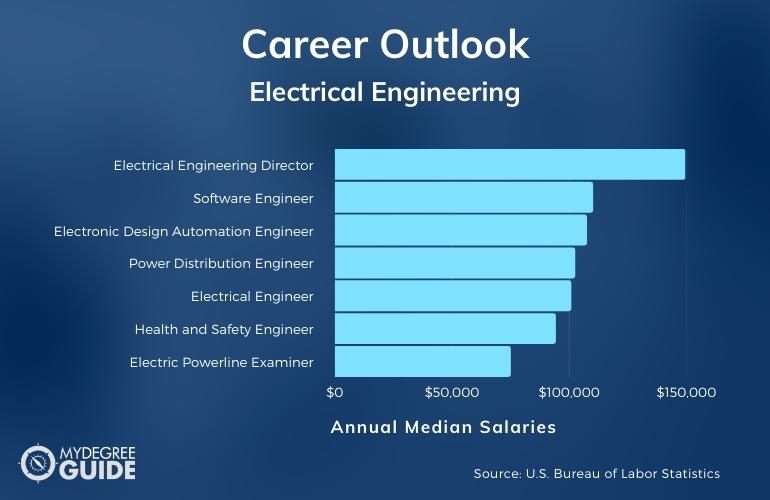An online electrical engineering degree can be your passport to a well-paid career. Even at the entry level, licensed electrical engineers with bachelor’s degrees earn well above average salaries.

If you always enjoyed math, science and computer courses in school, the online bachelor’s in electrical engineering could open the doors that you want to walk through.
Editorial Listing ShortCode:
Go ahead and dare to dream big! We’re not saying that the work is easy, but you can definitely reap the rewards of earning your online degree in engineering.
Universities Offering Online Bachelor’s in Electrical Engineering Degree Programs
Methodology: The following school list is in alphabetical order. To be included, a college or university must be regionally accredited and offer degree programs online or in a hybrid format.
1. American Public University
American Public University’s Bachelor of Science in Electrical Engineering combines mathematics, science, and engineering theories into a curriculum that challenges and prepares students for careers in technology.
APU’s online classes and in-person opportunities foster critical thinking alongside engineering expertise. A senior design seminar is available as students complete their degree.
APUS is accredited by the Higher Learning Commission.
2. Arizona State University
Arizona State University’s online BSEE offers a comprehensive education from an award-winning faculty. Students will choose a concentration, between energy systems and electrical power, to best prepare them for their future engineering careers. ASU’s Ira A. Fulton School of Engineering is regarded in the highest 25% of accredited programs.
Arizona State University is accredited by The Higher Learning Commission.
3. Clemson University
Clemson’s Holcombe Department of Electrical and Computer Engineering offers an in-depth education, from robotics to entrepreneurship and more. Students can join a creative inquiry project to work as a team under a mentor toward a subject that interests or inspires them. A capstone project rounds out the four-year degree program.
Clemson University is accredited by the Southern Association of Colleges and Schools Commission on Colleges.
4. Colorado Technical University
Colorado Technical University’s Bachelor of Science in Engineering is built around a flexible schedule catered to each student. CTU’s challenging course load is built around learning outcomes meant to prepare students for a variety of technical careers. Prospective students can submit a background for a next-day advisor meeting.
Colorado Technical University is accredited by the Higher Learning Commission.
5. Daytona State College
Daytona State College’s Bachelor of Science in Electrical Engineering combines an online course load with hands-on lab work.
Students can become familiar with technologies big and small, from microprocessors to the electrical circuits that power neighborhoods. Students also receive the education to prepare them for supervisory or managerial careers.
Daytona State College is accredited by the Southern Association of Colleges and Schools Commission on Colleges.
6. East Coast Polytechnic Institute University
East Coast Polytechnic Institute’s online degree in Electronic Systems Engineering Technology gives students the theory and practice they need to succeed. EC Polytechnic places a focus on professional development as well as academic study. Students can take a concentration in electronic systems to further develop their expertise.
ECPI University is accredited by the Southern Association of Colleges and Schools Commission on Colleges.
7. Eastern New Mexico University
At Eastern New Mexico University, students may choose between an analog or digital concentration in their online Bachelor of Science in Electronic Engineering. Students have a variety of helpful services, from writing tutors to financial aid. ENMU is dedicated to securing its students a stable career after graduation.
Eastern New Mexico University is accredited by the Higher Learning Commission.
8. Excelsior College
Excelsior College offers an online Bachelor of Science in Electrical Engineering that gives students knowledge across all layers of modern technology. With three different concentrations to choose from, students can graduate with the scientific and mathematical expertise to pursue their career goals in the world of technology.
Excelsior College is accredited by the Commission on Higher Education of the Middle States Association of Colleges and Schools.
9. Florida International University
Florida International University’s College of Engineering and Computing boasts a faculty of over 30 professionals with industry experience. Students can become experts in automation, technology, and energy systems with both academic knowledge and hands-on expertise. This ABET-accredited program begins in the Spring, Summer, and Fall.
Florida International University is accredited by the Southern Association of Colleges and Schools Commission on Colleges.
10. Frostburg State University
Partnered with Anne Arundel Community College, Frostburg State University Engineering students have the opportunity to take a concentration in electrical engineering.
Frostburg’s engineering faculty boast a wide range of career experiences, allowing students to explore their future career options. A flexible schedule of day and night classes is available.
Frostburg State University is accredited by the Middle States Commission on Higher Education.
11. Indiana State University
Indiana State University’s online Bachelor of Science in Electronics Engineering Technology prepares students for the growing world of modern tech. This transfer-student friendly program lets students learn from full-time faculty members to get the skills and knowledge they need for success.
Indiana State University is accredited by the Higher Learning Commission.
12. Lamar University
Lamar University’s ABET-accredited Phillip M Drayer Department of Engineering offers a hybrid model of online and in-person education. Students will be able to work at their own schedules while having direct and regular access to faculty. Lamar’s BSEE is rated fifth in the nation among other engineering programs.
Lamar University is accredited by the Southern Association of Colleges and Schools Commission on Colleges.
13. National University
At National University’s Bachelor of Science in Electrical and Computer Engineering, students will receive a high quality technical and hands-on education at the largest nonprofit university in San Diego. New scholarships, such as the Opportunity scholarship, are available to online and in-person students as they acquire the knowledge to succeed.
National University is accredited by the Western Association of Schools and Colleges.
14. Old Dominion University
Old Dominion University’s Bachelor of Mechatronics Systems Technology, also known as Electrical Engineering Technology, offers a wide range of courses and learning opportunities.
From academic know-how to experience in testing, design, and communications systems, students of Old Dominion can acquire the tools they need to thrive in the engineering field.
Old Dominion University is accredited by the Southern Association of Colleges and Schools Commission on Colleges.
15. Oregon Institute of Technology
Oregon Institute of Technology offers its Bachelor of Science in Electrical Engineering students the ability to customize their degree to suit their career goals. From base knowledge to expertise in high-tech systems, OIT’s small class sizes and advanced faculty provide the atmosphere for a top tier engineering education.
Oregon Institute of Technology is regionally accredited by Northwest Commission on Colleges and Universities.
16. Southern Illinois University – Carbondale
Southern Illinois University at Carbondale offers an online Bachelor in Electrical Engineering Technology that is affordable and well-rounded. Students can customize their expert curriculum to suit their individual academic needs with a variety of readings, lectures, and hands-on work with lab materials.
SIU – Carbondale is accredited by the Higher Learning Commission, a Commission of North Central Association of Colleges and Schools.
17. Stony Brook University
Stony Brook University’s Bachelor of Science in Electrical Engineering is balanced for students with a busy work schedule. Stony Brook’s flexible classes are delivered in a convenient online model to get students the education they desire to get ahead. This ABET-accredited program boasts a skilled faculty and challenging curriculum.
Stony Brook University is accredited by the Middle States Commission on Higher Education.
18. Texas State University
Texas State University’s Bachelor of Science with a major in Electrical Engineering offers a wide range of interdisciplinary courses designed to prepare students for the complex technology world. With three concentrations and a focus on student success, Texas State connects students with the knowledge and skills to achieve their dreams.
Texas State University is accredited by the Commission on Colleges of the Southern Association of Colleges and Schools.
19. Thomas Edison State University
Thomas Edison State University offers a cutting-edge Bachelor of Science in Electrical Engineering. Students are given the leadership, knowledge, and industry expertise to thrive in their academics and in their future fields. TESU is dedicated to both student achievement and the betterment of their local and global communities.
Thomas Edison State University is accredited by the Middle States Commission on Higher Education.
20. University of Arizona
The University of Arizona is home to a one-of-the-kind Bachelor of Science in Electrical Engineering. Online students receive the same lectures and professor attention as anyone on campus, from a renowned and industry-experienced faculty.
The University of Arizona is accredited by the Higher Learning Commission.
21. University of Massachusetts – Lowell
The University of Massachusetts-Lowell’s Bachelor of Electronic Engineering combines critical thinking skills with expert knowledge of engineering and mathematics. Besides preparing its students for the field of engineering, UMass Lowell’s BS also prepares motivated students to move on to their graduate program.
The University of Massachusetts Lowell is accredited by the New England Commission of Higher Education.
22. University of Michigan – Dearborn
University of Michigan Dearborn offers a rigors BSE program in Electrical Engineering online. UM Dearborn is aware of the wide selection of technological fields that graduates can pursue, and offers a balanced curriculum. Students have the opportunity to choose between concentrations and interests while maintaining the necessary baseline skillset.
The University of Michigan-Dearborn earns its accreditation through the Higher Learning Commission.
23. University of North Carolina – Charlotte
UNC at Charlotte offers an online program catered to students with associate degrees who want to finish out their bachelor’s. With courses, lectures, and readings the same as those offered on-campus, this online degree in electrical engineering presents an affordable opportunity to get ahead in the field of technology.
UNC Charlotte is accredited by the Southern Association of Colleges and Schools Commission on Colleges.
24. University of North Dakota
The University of North Dakota’s BS in Electrical Engineering has been available as a distance degree for 40 years. This program offers students the baseline knowledge to ready them for the world of technology: mathematics, science, leadership, critical thinking, and the entrepreneurial drive to flourish in their careers.
The University of North Dakota is accredited by the Higher Learning Commission of the North Central Association of Colleges and Schools.
25. University of Toledo
At the University of Toledo’s BS in Electrical Engineering Technology, students receive a balanced curriculum between engineering theory and its application. An acclaimed co-op program lets students build their resume as they receive their degree, giving them an edge as they graduate and enter their new career field.
The University of Toledo is accredited by the Higher Learning Commission.
Online Electrical Engineering Degrees

Perhaps you’ve always been fascinated by electronics and computers. That’s why you’re interested in earning a bachelor’s degree in this field. An online program can allow you to balance other aspects of your life, such as work and family, while you move forward toward your dream job.
Typical electrical engineering degree requirements include courses in calculus, physics, and computer science. They also teach how to design digital and analog circuit boards. Additional courses may cover data communications, digital signaling systems, and how to build digital circuits.
Before starting an electrical engineering degree online, you probably want to know what career paths it can lead to. There are many choices, and your individual interests can take you in the right direction.
You may want to be an engineer or technician who designs electrical and communication systems. Of course, you might also consider a career as a computer hardware engineer or an aerospace engineer. These careers require a bachelor’s degree in electrical engineering.

Plan for a career as an electrical engineer if you want to design electrical systems for communication or navigation.
You can work in the energy industry, information technology, data communications, transportation safety, or business and home security systems. Or, you might want to design and oversee manufacturing for electrical systems that go into automobiles, aircraft, or buildings.
The electrical engineering online degree can prepare you for a career as a computer hardware engineer, too. Consider going in this direction if you love working with routers and networks, processors and memory boards.
You’ll probably collaborate with software developers in this career field, and you may even take a class or two from an online software engineering degree program.
Consider pursuing this degree program if you are interested in a career as an aerospace engineer. If you want to design the electrical systems and test the prototypes that go into aircrafts or to outer space, you may start with an online bachelors degree in electrical engineering instead of an online bachelor’s in aerospace engineering.
Electrical Engineering Careers & Salaries

Before you invest the time, energy, and money to complete an online electrical engineering bachelor’s degree, you probably want to know what the degree is worth. Here is an overview of job opportunities, income-earning potential, and future job growth.
Electrical engineers create and design products and oversee the manufacturing of those products. They work in diverse industries such as aerospace, automotive, data communications, energy, and information technology.
Working as an electrical engineer, you may create electrical systems for devices as small as iPhones or as large as hydroelectric power generators.
The work environment of an electrical engineer could be in research and development or in manufacturing. With a bachelor’s degree, you may find yourself working in telecommunications, in a federal government job, or for a large private corporation.
In the future, careers for electrical engineers are likely to center around consumer electronics and electronic devices. Additionally, there will be a need for electrical engineers to create the systems that run data communications, manufacturing, and power generation.
The average annual salary for an electrical engineer with a bachelor’s degree is $93,000 (Center on Education and the Workforce). You can earn a higher salary by working your way up to a senior level or management position.
According to the Bureau of Labor Statistics, the following are some careers in the electrical engineering field:
| Careers | Annual Median Salary |
| Electrical Engineering Director | $149,530 |
| Software Engineer | $110,140 |
| Electronic Design Automation Engineer | $107,540 |
| Power Distribution Engineer | $102,510 |
| Electrical Engineer | $100,830 |
| Health and Safety Engineer | $94,240 |
| Electric Powerline Examiner | $75,030 |
| Electronic Maintenance Supervisor | $70,240 |
| Electrician Supervisor | $67,840 |
| Semiconductor Development Technician | $67,550 |
The U.S. Bureau of Labor Statistics projects that the electrical engineering career field will grow at a rate of 5% for the next ten years. This statistic represents 9,000 electrical engineering jobs added during that time.
Even an entry level position for an electrical engineer with a bachelor’s degree typically earns well above the mean salary range for Americans. On top of that, you should have excellent opportunities for advancing to higher-paying positions. All in all, the degree can be well worth the time, money, and effort that you’ll put into earning it.
Choosing an Online Electrical Engineering School

Once you decide to pursue an online electrical engineering degree, you’ll want to shop around for the best schools. Here are a few features to consider:
- Tuition cost
- Financial aid
- Student-to-faculty ratio
- Degree program accreditation
- Special concentrations within the electrical engineering bachelor’s program
- Acceptance rate
- Graduation rate
- Job placement services
- Counseling services
- Acceptance of transfer credits
- Credit for experience
Some online electrical engineering degree programs are designed to work in tandem with previously earned credits to complete the full bachelor’s degree. These programs rely heavily on transfer credits.
Typically, the engineering courses are upper level, and entry into those courses is dependent upon completing basic freshman/sophomore foundation courses.
Having said that, there are programs available that allow you to complete the entire bachelor’s degree program online. It’s worth your time to carefully research multiple schools and make an informed choice.
Online Bachelor’s in Electrical Engineering Courses

On your way toward a lucrative career, you’ll need to take numerous electrical engineering courses that will prepare you for the work. Here is a brief sampling of courses you will probably need to take:
- Calculus – Analytic geometry functions, derivatives and graphing, continuity, definite and indefinite integrals.
- Circuits I & II – Analyzing, designing, and building linear and nonlinear analog and digital circuits.
- Introduction to Engineering – The engineering profession, the engineering design process, working in teams, and communication skills.
- Fundamentals of Digital Design – Understanding number systems, Boolean algebra, conversion methods, synchronous sequential circuits, and more.
- Fundamentals of Electromagnetics – Vector fields, electro/magneto statics, vector analysis, and magnetic materials.
- Computer-Aided Measurement and Controls – Evaluation of software designed to perform measurement and control algorithms in a laboratory environment.
- Engineering Data Analysis – Basic probability theory and basic statistics theory applied to engineering problems and case studies.
- Embedded Systems – Studying the interface of microcontroller hardware and software with external electronic devices to achieve communication and control in an embedded system.
- Principles of Programming with C++ – Fundamental algorithm design and techniques, computer systems concepts, along with ethical implications.
- Senior Design Laboratory – Teamwork in the design process, including research, concept, feasibility, and generating a proposal.
This list represents only a few of the courses that you’ll probably complete in your online electrical engineering bachelor’s degree program.
Admissions Requirements

After selecting the college or university that best meets your needs, your next step will be to apply and be admitted to the program. Here are a few admissions criteria that you’ll want to consider.
- Successful completion of high school science and math courses. These may include biology, chemistry, earth science, and physics along with 4 sequential years of math courses.
- High school GPA – Individual institutions will state their minimum requirements for high school grade point average. While you’re researching schools, check to be sure that your GPA meets their requirements.
- ACT/SAT scores – Some colleges and universities require minimum scores on ACT and/or SAT tests. Other institutions do not. Check to see if these tests are required by the schools that you’re researching.
While you’re in the research and selection stage for your electrical engineering online degree, be sure to check out the admission requirements stated by each institution.
Accreditation

As you prepare to work on your bachelor’s in electrical engineering, it’s important to understand accreditation of degree programs. You’ll invest time, effort and money into getting your degree, so you want it to be the highest quality. With a degree from an accredited institution, you can enter the professional field with solid credentials.
When you consider a college or university, check to be sure it is accredited by one of these regional accrediting organizations.
- Higher Learning Commission
- Middle States Commission on Higher Education
- New England Commission of Higher Education
- Northwest Commission on Colleges and Universities
- Southern Association of Colleges and Schools Commission on Colleges
- WASC Senior College and University Commission
In the field of electrical engineering, check for a specialized engineering degree accreditation. The degree-specific accrediting organization is the Accreditation Board for Engineering and Technology (ABET). ABET accreditation is a seal of approval for an online bachelor’s in electrical engineering.
Financial Aid and Scholarships

No doubt, college tuition is expensive. As you pursue an online degree, the investment will be substantial. That’s why it’s well worth your time to investigate financial options such as Federal aid, State aid, scholarships, and employer programs.
Federal student aid is available through the U. S. Department of Education. Types of financial aid include grants, scholarships, loans, and work-study jobs. Financial aid is available for international study, too.
Many universities offer substantial tuition savings for active duty military personnel. Federal student aid is also available for military veterans and families.
Check out the financial aid available through your state, too. Individual states offer grants and scholarships. Many states extend merit-based scholarships to resident students who attend in-state colleges and universities.
You will also want to investigate the institutional financial aid offered by the university that you choose. Many colleges, businesses, and other organizations offer scholarships and grants.
What Can You Do with an Electrical Engineering Degree?

With a B.S. in electrical engineering, you can step into a professional field with multiple career options. Your individual interests will dictate where you go with your degree.
According to the Bureau of Labor Statistics, electrical engineers develop and improve the products that we use every day by designing new ways to use electrical power. Their jobs involve making detailed calculations to ensure quality in manufacturing and construction.
Electrical engineers are responsible for manufacturing, installing, and testing electrical equipment to certify that it meets codes and specifications. They make sure that production projects are completed on time and within budget.
What’s the Difference Between Electrical Engineering vs. Computer Engineering?

Engineers apply scientific principles to solve problems and build things. Electrical engineering is an expansive field that incorporates many types of jobs involving the generation, transmission, and conversion of electrical energy.
Electrical engineers may work with electrical circuits in common personal devices, or they might design and oversee electrical installations in large buildings or power plants. Jobs for electrical engineers involve design, development, problem solving and equipment testing for electrical systems.
Computer engineering is a branch of electrical engineering. As a computer engineer, you may work in computer hardware or software engineering. Other jobs include IT security and networking.
What’s the Difference Between Electrical Engineering vs. Computer Science?

Entry-level jobs in both computer science and electrical engineering require a bachelor’s degree. Both fields require strong skills in math, logic, analysis, and critical thinking as well as heavy computer usage.
One noteworthy difference between the two fields is that the electrical engineering degree can lead to a wider array of job opportunities than a computer science degree.
Electrical engineers often work in teams where excellent written and oral communication of technical information is crucial to success. Computer scientists need communication skills, too. But their jobs depend more on analysis, problem solving, and attention to detail.
What’s the Difference Between Electrical Engineering vs. Mechanical Engineering?

Careers in both electrical engineering and mechanical engineering require bachelor’s degrees. According to the U. S. Bureau of Labor Statistics, electrical engineers are typically paid higher than mechanical engineers. But both can work their way up to six figure incomes.
Electrical engineers work on designing and manufacturing electrical systems, with an emphasis on electrical power generation. Mechanical engineers perform those functions with emphasis on power application: getting physical parts to move as desired to accomplish work.
Mechanical engineers engage more with the design and manufacture of machines. Examples range from small rechargeable batteries for handheld devices or large gas turbines.
How Long Does It Take to Get an Electrical Engineering Degree Online?

The length of time required to complete an electrical engineering online degree depends on your circumstances and how you enroll in courses. Based on a 16-week semester system with consistent fulltime enrollment, you should be able to complete the degree in four years.
There are other enrollment models, and different schools organize their semesters differently. If you enroll continuously in 8-week semesters year-round, you can shorten the time that it takes to finish your degree.
Are There Any Affordable Online Electrical Engineering Degrees?
Yes, you can find affordable electrical engineering degree programs online. As you’re researching schools, check out their costs per credit hour. Note the number of credit hours that you’ll earn per course. Then, you’ll be able to calculate your overall cost for the degree.
As a rough estimate, you can expect to pay approximately $200 to $360 in-state tuition per credit hour for institutions in the economical range. Out-of-state tuition costs are higher. Calculate fees as well as tuition when you’re planning ahead. And, if you’re a veteran or active duty military, look for savings on tuition costs.
Is Electrical Engineering Better Than Computer Science?

The average annual salary for an electrical engineer with a bachelor’s degree is $93,000 (Center on Education and the Workforce). For a computer scientist with a bachelor’s degree, the average salary is $83,000. According to the Bureau of Labor Statistics, both careers show earning projections higher than average for all occupations. There is no way to say that one career is “better” than the other. It’s up to you.
Electrical engineering presents a broader field of job possibilities, and professionals spend more time working in teams to solve problems through applied science. On the other hand, computer scientists usually work as software developers, computer systems analysts, or database administrators.
Is an Electrical Engineering Degree Worth It?
Yes, an electrical engineering degree is worth it for many students. The Bureau of Labor Statistics is projecting 3% job growth in architecture and engineering occupations over the next 10 years. Common careers in this field include computer hardware engineering, avionics engineering, testing and development, communication systems engineering, and power generation.
From an entry level position, you may be able to work up to higher positions such as a manager or electrical engineering director. This degree can qualify you to work in a broad range of sectors, including aerospace, mining, power generation, and manufacturing. Insurance, retirement, and paid vacation benefits are available, too.
Getting Your Bachelor’s in Electrical Engineering Online

If you’ve made it this far in the article, you’re ready to begin your search for a program offering online bachelor’s degrees. At this stage, you’ll want to do your homework, considering the criteria presented here.
Based on your individual circumstances, location, and preferences, you can find a suitable institution with an accredited degree program that is right for you.
The course work will be challenging, but the journey can open your mind to ideas and concepts beyond what you can currently imagine. Completion of this degree can open the doors to an exciting career.
